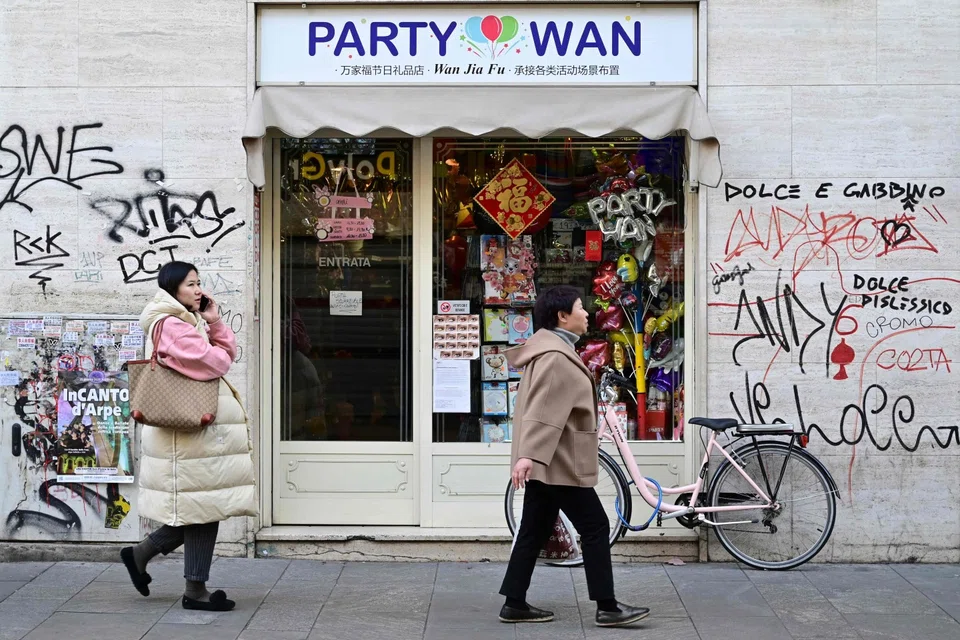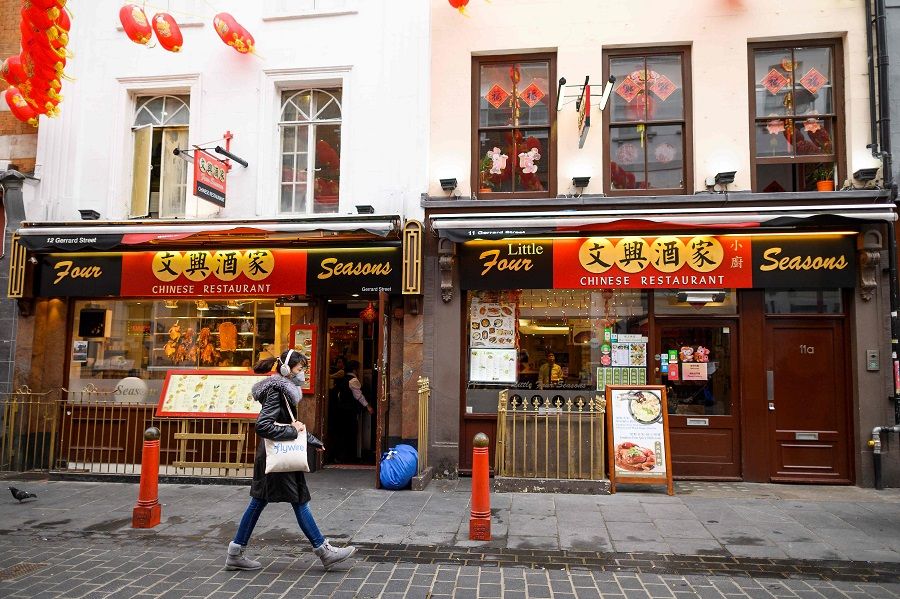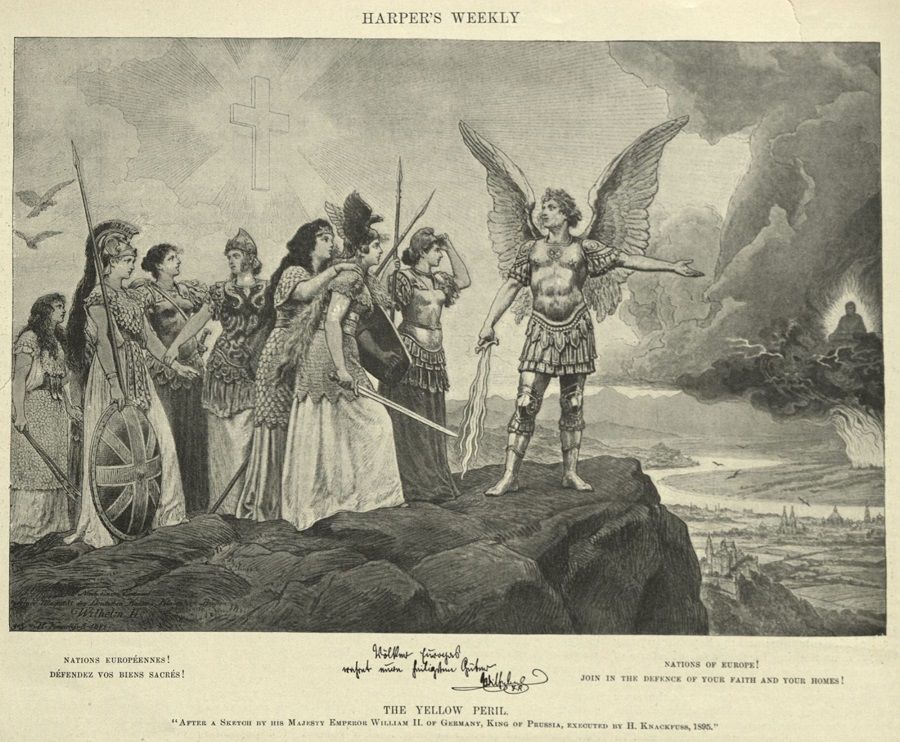Covid-19: Racist behaviour must not go unchecked in Europe

As Covid-19 spreads around the world, the Chinese in Europe are having to contend with some old problems once more.
At the end of January, Der Spiegel ran a cover story entitled "Coronavirus Made in China". In February, a Chinese girl looking to rent a place was turned down by a homeowner who "did not want to contract the coronavirus". In March, AIDA Cruises, a European luxury ship operator, published a "Coronavirus Q&A" on its website in keeping with the current situation. One of the questions was: "Are there Chinese passengers or employees on board our ships?" The answer which almost smacks of self-praise read: "While we are unable to prevent passengers who are long-term residents of Germany, Austria and Switzerland from having a Chinese passport, none of our employees is a Chinese citizen."
Such occurrences are not unique to Germany. In March, the owner of a Chinese massage place in Toulon, France, received an anonymous letter peppered with basic grammatical mistakes. The letter, written in French, included a sentence saying, "The Chinese brought the virus to France."
So, why is it that in multi-ethnic societies, we often notice certain groups leading better or more relaxed lives on the whole than others?

I am not trying to exaggerate the facts, stir up hatred, or incite conflicts by writing this article. After all, the safety and property of most Chinese in Europe were not compromised. But, does that mean they should simply laugh off such "minor unpleasantness"?
Why are such speech and acts racist?
First, there is a need to clarify that racism is a social construct. The innate differences between different races are not significant. So, why is it that in multi-ethnic societies, we often notice certain groups leading better or more relaxed lives on the whole than others? And why is it that we often mention "racism" and "racial discrimination" in the same breath?
Racism stems from the collusion of institutional and cultural power structures in a society. Institutional power structure refers to the social hierarchy as expressed through various prescribed rules. On the other hand, cultural power structure is based on value judgement through stereotypes to arbitrarily pigeonhole people. As for stereotypes, they refer to the general labelling of groups of people regardless of individual differences. Racial discrimination is a social outcome of reinforcing such stereotypes, whereby specific groups are debased or diminished indiscriminately.
The various European countries, depicted as Roman gods, should protect their pure subjects by conquering and subjugating China. It is through this argument that "yellow race" became associated with "peril".
For example, "yellow race" is a relatively recent term. During Marco Polo's lifetime, Chinese was not thought of or described as having yellow skin by Westerners. Instead, they were "darker", like southern Europeans. The "yellow race" concept was born after the Industrial Revolution, when the West was preparing to colonise the rest of the world. The "yellow peril" theory was put forth to justify colonisation.
At the heart of that theory was the drawing of parallels between the Chinese and Genghis Khan, well-known for being a destroyer and marauder in his conquest of Europe during the Middle Ages. There are many classic examples, such as a painting by the German Emperor, Wilhem II (1888-1918), in 1895, with the admonition: "People of Europe, protect your most sacred possessions!" In the picture, European countries such as Germany, England and Italy were depicted as fair and mighty beings gazing at a distant shore that had ominous dark clouds overhead. That faraway land represented Asia, and the message was clear: Asia, especially China, is a threat to Western civilisation. The various European countries, depicted as Roman gods, should protect their pure subjects by conquering and subjugating China. It is through this argument that "yellow race" became associated with "peril".

If the term "peril" came about due to a conflict of interest, the following is a series of preconceived descriptions that further disparages the "yellow race" from the social status and morality perspectives, leading to a revolting overall image of the race: "Regardless of the standards used, the Chinese are a bunch of uncivilised and unhygienic people. They do not have any high-class familial or social relations; they are greedy and lecherous. Their women are the lowest-grade whores." Closely related to these descriptions are the seemingly objective observations of Chinese having "pigtails" and "slitty eyes" that are in fact generic labels which are downright derogatory, with unpleasant social associations, and are easily propagated.
It should also be mentioned that stereotypes are very tenacious and can keep up with the times to satisfy actual needs. The usage and extension of "yellow peril" and its associations did not end with modernity. Using Der Spiegel as an example, "Die Gelbe Gefahr" (The Yellow Peril) is the title of its cover story for issue 45 in 1978. In issue 35 of 2007, its cover page featured a woman with typically slitty eyes, peeping from behind a set of blinds with the Chinese flag painted on. The words "Die Gelben Spione" (The Yellow Spies) were also printed on the cover, with the following caption in smaller font, wie China deutsche Technologie ausspäht (how China stole German technology).
Through socialisation, such pigeonholing is reinforced to the extent that the infringement of rights occurs without a hint of guilt. When specific groups are debased or diminished indiscriminately, exclusion and violation of interests follow.
Next, let us examine the real message that AIDA and Der Spiegel are sending: the coronavirus is made in China, since there are almost no Chinese on our ships, the risk of catching the virus is also very low. Does this not go against what is acceptable? Such undifferentiated bashing of China and its people will only propagate the stereotype that equates China and its people with the virus.
The next time someone tries to act innocent, magnanimous, or objective in the face of racism, please use the above train of thought to rebuke him or her.
Why such words and deeds should not be tolerated?
As mentioned earlier, racism stems from the collusion of institutional and cultural power structures in a society. By collusion, I mean that the pigeonholing of different races based on value judgement is a consequence of the conflict of interests between different social levels. Through socialisation, such pigeonholing is reinforced to the extent that the infringement of rights occurs without a hint of guilt. When specific groups are debased or diminished indiscriminately, exclusion and violation of interests follow.
The tragic fate which befell the greedy Jewish moneylender, Shylock, in Shakespeare's famous play, The Merchant of Venice, epitomises such social narratives.
The victims of racism are then brainwashed using the following refrain: "You should accept being excluded, making little money, or leading a hard life because you are in the wrong." At the same time, a dichotomy of "us" and "them" is established to send the following message to other members of society: "They are not doing well because of poor conduct and they do not deserve to be treated well. Since we are in the right, we do not have to hold back rubbing salt into their wounds."
A well-known example of what is described in the preceding paragraph is the plight of the German Jews in the first half of the 20th century. What prepared the public for the Holocaust were the labels that have long been affixed to Jews, such as "murderers of Christ the Saviour", "aliens", "conspirers to control the world", and "greedy and cunning". These labels were then underscored time and again through social narratives. The tragic fate which befell the greedy Jewish moneylender, Shylock, in Shakespeare's famous play, The Merchant of Venice, epitomises such social narratives.
On the other hand, the numerous, nameless Chinese railroad workers and miners who endured horrible working conditions in America and Canada are still skeletons in the closet.

The collusion tactics tend to be highly similar. Fu Manchu, a popular fictional character in the West between the 1910s and the 1930s, embodies Chinese stereotypes such as "slitty eyes" and "pigtail-wearing". Fu Manchu was portrayed as a villain in various novels and movies. His cunning and murderous ways, as well as a penchant for violating white virgins cemented the stereotypes. On the other hand, the numerous, nameless Chinese railroad workers and miners who endured horrible working conditions in America and Canada are still skeletons in the closet. When Canada introduced its Chinese Immigration Act of 1885 to levy a head tax on Chinese immigrants, it was deemed warranted. At around the same period, exclusion of the Chinese and violation of their rights on a large scale occurred in America and Canada. For instance, the United States Immigration Act of 1924 nearly prohibited immigration from Asia.
The Angel Island Immigration Station near San Francisco began operations in 1910. At the facility, 192 beds were crammed into an approximately 250 sqm space. Many Chinese had to spend a year or more there, after being examined in a naked state, before being granted permission to enter America or repatriated. The abysmal living conditions drove many inhabitants to commit suicide.
The next time people comment that the Chinese are overly sensitive, please accost them with these well-known historical facts.
How do we fight this?
Under such extreme circumstances, there is a need to use existing laws and regulations for self-protection. For example, the remarks by AIDA are examples of the violations described in the press releases issued by the German Federal Anti-Discrimination Agency on 29 November 2019 and 12 February 2020 respectively. In the former, the agency explicitly prohibited discrimination based on nationality since differentiated treatment according to nationality is a type of racial discrimination. In the latter, the agency wrote that it has observed "people being excluded and disadvantaged because of their appearance or origin" and advised "people who are unfairly treated in their daily lives because of their ethnic origin to take legal action and sue the perpetrators of discrimination for compensation".
However, it is grossly inadequate to rely solely on the law. Since laws are founded on social consensus, only by enhancing it will stricter laws be enacted, and enforcement be more stringent. Everyone says that Germany has zero tolerance for racism. So, has anyone thought about what would happen if Jews were to experience what the Chinese encountered?
Jewish voices are heard through a series of public discussions and there is very little room for Jewish stereotypes to survive in public opinion. As such, it is difficult to justify the exclusion and oppression of Jews in Germany.
Many would say "No way" and that is my point. The fact is, be it in Germany or even Europe, very few would dare say "Jews brought the virus", "We do not have Jewish employees", or "The virus is made in Israel". Within the same legal framework, why are Chinese treated so differently from Jews?

Looking at the work done by the Central Council of Jews in Germany provides a glimpse of the answer. It is only March but the council had already issued four statements, with topics ranging from commemorating The Holocaust to condemning the February shootings by a far-right extremist in Hanau. Jewish voices are heard through a series of public discussions and there is very little room for Jewish stereotypes to survive in public opinion. As such, it is difficult to justify the exclusion and oppression of Jews in Germany.
Evil triumphs not because it has many accomplices, instead, it is because good men do nothing.
This shows that in order to get to the root of the problem, there is a need to prevent the circulation of stereotypes in society through repeated public discussion, and to be alert to speech and acts that aim to fabricate dichotomy and differentiation.
To reiterate, racism stems from the collusion of institutional and cultural power structures in a society. Allowing racist behaviour to go unchecked is to objectively reinforce the stereotypes that debase a race. This is akin to accepting and propagating that value judgement that the race is inferior. Doing so provides an unobstructed path for all members of the race to be subjected to exclusion and oppression, whether covertly or overtly. To be explicit, that means the politically-correct treatment that minorities (such as the Jews) enjoy in Germany or even Europe would not be extended to the Chinese. Evil triumphs not because it has many accomplices, instead, it is because good men do nothing.
Knowing is much easier than doing. Do not let such things happen to the Chinese again.
